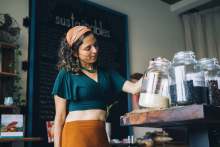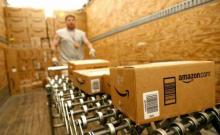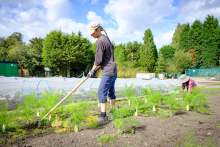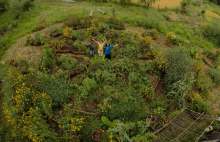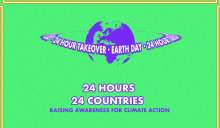A couple of months ago, we spoke to Less Waste Laura for tips on how to get started with a zero waste lifestyle and what she has been up to since lockdown started.
For anyone looking to make changes to their lifestyle impact, what would be your recommendation for the best place to start?
One of the best places to start is where you are already at. There is no need to go and buy a whole load of sustainable items or get yourself prepared to make switches for the better. You can simply start right where you are.
When I began my journey to less waste and looking into more sustainable and ethical options, I did it in a step-by-step and slow sustainable way. For example, when something ran out, like toothpaste, shampoo or pasta, I would simply go and find a plastic-free alternative to that one thing. This meant that slowly, one-by-one, I was changing everything around me only when I had to.
My toiletries were one of the easiest things I found swaps for, mainly because of the large range of items you can find easily online or in zero waste shops. Then came groceries, which took a bit more planning, but after finding some local plastic free shops, fruit and veg boxes and minimal-plastic options it was sorted!
If you would like to do a more targeted approach, I would recommend a ‘waste audit’. This is simply collecting your waste (even when out and about), so that after two weeks or so you can look through it and pinpoint the items that create the most waste in your life. You can then make a plan for these. For me it was meal deal packaging and good on-the-go, but each of us will be individual and can make plans to tackle each item.
We try to cover as much as we can when investigating ethical brands and products, but we can’t always cover everything. When doing your own research for ethical brands, what do you look out for?
When doing my own research, the most important tip I have is to often stay away from a brand’s website as much as possible. Of course the information on there will be telling you they are amazing, so make sure to look around and search for news stories or links to activity outside of their own website and media.
Then I look for the history a brand has with things like news coverage and collaborations, how they interact with supporters/customers online, and how they respond more generally to the outside world. It says a lot who a brand is willing to work with and in what ways, and how they carry themselves online.
It is also key to look out for accreditations or certifications they might hold to keep them transparent, and see how they are holding themselves accountable.
Living a sustainable lifestyle isn’t easy. What challenges have you faced whilst trying to do this?
The biggest one has been the changing accessibility of ethical choices as my situation has changed, which reflects the more general problem of accessibility more widely. For example, as a student with no dependables, I had the most disposable income and time I probably ever will in my life. This allowed me to shop around and find the best places to get my groceries and different items.
Moving to a new area without a zero waste shop within walking distance, no longer being a student, and having new responsibilities has changed the ease with which I can wander around my town getting the perfect sustainable items for my life. However, with more and more brands and shops opening up this is becoming easier month-on-month.
In your eyes what are the greatest challenges facing the environmental movement?
The lack of action from Governments and businesses to take responsibility and put in place decisions that will help us transition fairly and quickly to less carbon intensive industry and economies. While activists work to make the movement more inclusive, accessible, and intersectional, we need the big changes to come from above to act with the urgency the climate and waste crisis deserves.
Over lockdown you’ve been sharing a lot about growing your own fruit and veg from food waste. What is your top tip for someone looking to reduce their food waste who might not have the time or space to do this?
The worst food for the planet is food that is wasted. One third of all food is wasted globally and food waste has the potential to be the 3rd biggest emitter if it was a country: we see the big problem but also the opportunity we have to save food waste, lower emissions, save money, and be more sustainable.
Some of my tips would be meal planning, storing food correctly, having a space in your fridge to indicate food that needs eaten as soon as possible, and of course knowing some waste saving recipes to help limit what you waste in your kitchen. Some of my favourite recipes are; squidgy banana granola, vegetable scrap soup and of course any dodgy fruit all blended up into a lovely smoothie!
You recently posted about alternative places to buy books than Amazon. Do you have a go-to online retailer that you use for other products that you might find on Amazon?
The easiest tip for avoiding Amazon (and other big retailers) is remembering that each item on these platforms will be made by an independent business who will most likely have their own website and platform to buy from.
If you are wanting to get something from Amazon or similar, why not quickly search the company name to see if you can buy it straight from them, and in most cases you will be able to!


